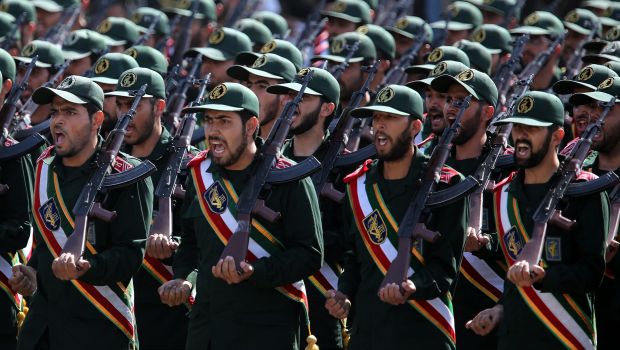
Iranian Revolutionary Guard soldiers march during the annual military parade marking the Iraqi invasion in 1980, which led to an eight-year-long war between the two countries, in Tehran, Iran, on September 22, 2013. (EPA/Abedin Taherkenareh)
Erbil, Asharq Al-Awsat—Iran will replace the military officer leading its response to the crisis in Iraq, a leading figure in Iraq’s biggest political bloc told Asharq Al-Awsat on Monday.
A senior member of the Shi’ite-led National Alliance, which includes parties with close links to Tehran, said that Qassem Suleimani, the notorious commander of Iran’s elite Quds Force, would be replaced by his deputy Hossein Hamadani for failing to obtain a third term in office for outgoing Iraqi prime minister Nuri Al-Maliki.
The Quds Force is an elite sub-unit of Iran’s paramilitary Islamic Revolutionary Guard Corps (IRGC), originally set up to spread the country’s Islamic revolution abroad. Today, it trains and advises regional allies, such as Lebanon’s Hezbollah, and pro-government militias in Syria and Iraq.
Its leader Suleimani has been in charge of Iranian security policy in Iraq since the fall of late dictator Saddam Hussein in 2003. He has recently been advising the Iraqi government in its efforts to combat the advance of the Islamic State of Iraq and Syria (ISIS).
The National Alliance member, speaking on condition of anonymity, said Suleimani’s biggest success in Iraq was elevating Maliki to the premiership and keeping his rival Iyad Allawi out of office, firstly in Iraq’s parliamentary elections in 2005, and again in 2009, despite Allawi’s bloc winning the largest number of seats in parliament.
Following inconclusive parliamentary elections at the end of March, Suleimani failed to persuade members of the National Alliance to agree to a third term as prime minister for Nuri Al-Maliki, leading to the decision to replace him, said the source.
“Appointing Hamadani means the closure of the Suleimani era in Iraq and the start of a new era coinciding with the appointment of Haider Al-Abadi as prime minister, and that the issue is not a reprimand for Qassem Suleimani, who is credited with many achievements in Iraq,” he added, though went on to speculate that ISIS’s seizure of Mosul and swaths of Iraqi territory in June may have reflected badly on Suleimani.
Hamadani is one of the founders of the IRGC in Iran’s Hamadan Province in 1980, and went on to serve in the Corps during the Iran–Iraq War.
Until 2009, he was assistant to the commander of Iran’s volunteer Basij militia, Hossein Taeb, but was soon promoted to commander of the IRGC in Tehran after his role in suppressing the public protests that erupted in the capital that year following Mahmoud Ahmadinejad’s victory in the presidential elections.
After the Syrian revolution erupted in 2011, Hamadani, acting as Suleimani’s deputy, was sent to supervise the defense of the Syrian capital, and is credited with saved Syrian President Bashar Al-Assad’s rule in 2012.
In May 2012, he announced the creation of a “second Hezbollah in Syria” in the form of a number of new militias to fight alongside Assad’s forces.
The National Alliance source told Asharq Al-Awsat: “Hamadani visited Iraq on a number of occasions and all his visits were secret, and some of the visits were made through Najaf [International] Airport as a Shi’ite pilgrim, under false names.”
“I met him once in the home of one of the leaders of the National Alliance where he wanted to listen to our views on the next government before the last elections,” he added. The source described Hamadani as “no less cunning than Suleimani, if not more so, because he was sharper and more extreme,” and said he was “known for his excellence in forming militias and armed groups.”

Trackbacks/Pingbacks